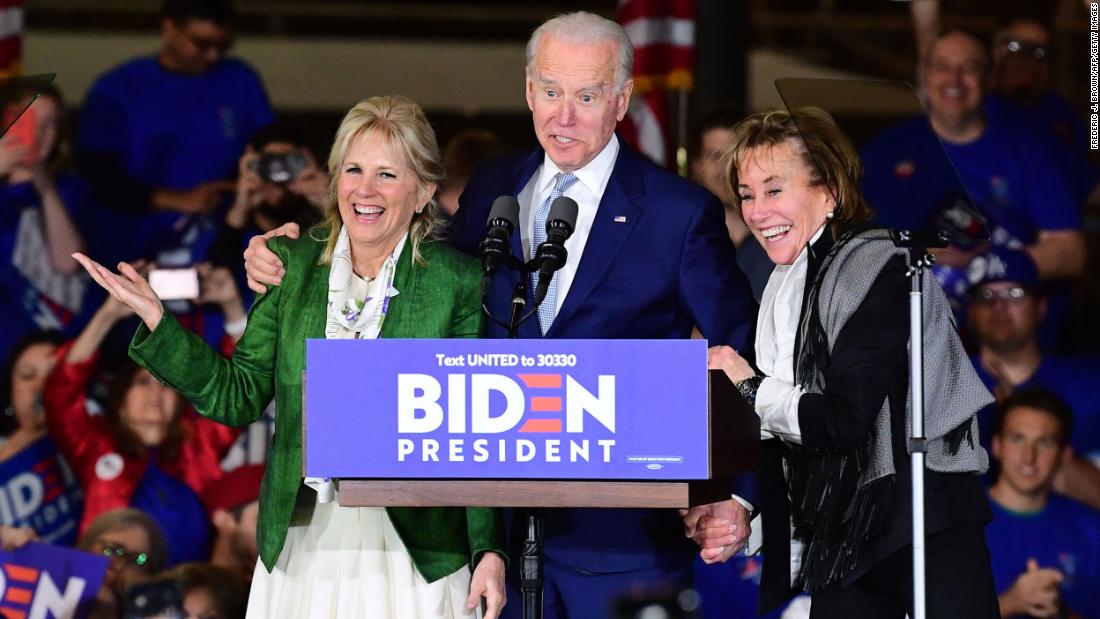[ad_1]
California counts all ballots postmarked by Election Day, extending the time it takes to report results, meaning the state’s impact on the Democrats’ delegate math won’t be clear anytime soon.
Here are five takeaways from Super Tuesday:
Biden rides the wave
Biden’s wins Tuesday were about pure momentum.
Biden won five states he hadn’t even campaigned in. The biggest surprises might have been Minnesota and Massachusetts, which his campaign had barely contested. He visited Virginia once, had one field office in the state and spent $233,000 on ads there — yet he won 53% of Virginia’s vote, while Bloomberg, who held the first rally of his campaign there and spent $18 million on ads in the state, couldn’t break 10%.
Biden demonstrated a base of support in the south, where African-American voters make up large shares of each state’s Democratic electorates, with wins in Alabama, Arkansas, Tennessee and Oklahoma, as well as heavily contested North Carolina. That bodes well for Biden in contests later this month in Mississippi, Georgia and Florida.
Biden’s big night has moved the Democratic race into a new phase, as he and Sanders prepare for a drawn-out delegate battle.
Biden builds a coalition
It was a forceful demonstration of the breakneck speed at which Biden has consolidated Democrats’ moderate wing since Saturday night. Monday’s endorsements of former South Bend, Indiana, Mayor Pete Buttigieg and Minnesota Sen. Amy Klobuchar — both of whom had appealed to Democrats in the suburbs — appeared to translate directly into votes from their supporters. In state after state, exit polls showed that Biden won overwhelmingly among voters who made their minds up in the last few days.
“People are talking about a revolution,” Biden said Saturday night in Los Angeles — on a basketball court at a recreational center off Obama Boulevard.
In a shot at Sanders, who has promised to bring new voters into the Democratic fold, Biden said: “We started a movement. We’ve increased turnout. They turned out for us!”
Sanders’ coalition of Latinos, younger voters, liberals and independents was harder to see immediately on Tuesday night, with California results still to come. But its relative strength will come into clearer focus soon.
Sanders’ night hinges on California
Sanders has a lead in California, which could ultimately deliver him the delegate bounty he needs to emerge from Super Tuesday with a lead over Biden.
And while Sanders had benefited from a fractured field in early contests, the moderate consolidation hurt him Tuesday.
Sanders will be further deflated a bit by losses in state he won back in 2016 — Oklahoma and Minnesota.
If he notches a significant win in California, the rest of the map might not seem so daunting. The question as the votes continue to be counted: Does Bloomberg, currently in third, and Warren, now in fourth, finish at or above 15% statewide.
If they don’t, Sanders could yet emerge from Super Tuesday with a lead over Biden.
Bloomberg fails
It’s a stunning turn of events for the Bloomberg campaign considering they spent over $230 million on ads alone in the Super Tuesday states and spent months leading into Super Tuesday touting his massive state-level organizations and racking up high-profile endorsements.
Tuesday night proved the limits of an endless advertising budget in an environment where campaign cove.
Even Bloomberg and his top aides struggled to spin his performance on Tuesday.
“As the results come in, here is what is clear. No matter how delegates we win tonight, we have done something no one else thought was possible,” Bloomberg told supporters at his Tuesday night party in Florida, pointing to his ability to move himself beyond 1% in the polls.
Kevin Sheekey, Bloomberg’s campaign manager, tried to downplay the importance of the biggest single day of the Democratic presidential race: “Tonight, only one-third of delegates will be allotted.”
Pressure is now likely to build on Bloomberg to exit the race to avoid splitting the moderate vote after his money did little to compete with a former vice president who benefited from universal name recognition and saturated media coverage.
Bloomberg aides in his New York headquarters are now considering the question they fear their candidate must answer soon: What exactly is his argument for staying in the race?
Warren’s harsh reality
Warren’s campaign has been premised for weeks on the idea that winning states outright should take a back seat to amassing delegates on the way to this summer’s national convention in Milwaukee.
But on Tuesday, Warren not only failed to win a single contest — including her home state, where she finished third behind Biden and Sanders — but appears unlikely to hit the 15% mark in more than a few states.
Now, Warren will have to assess her path forward.
A top Democrat and Warren confidant said she deserved the time to come to a decision on her own and shouldn’t be pushed from the race. But the reality is clear: She has no path.
“There is no path forward for her,” the top Democrat said Tuesday night. “It’s beneath her to remain” in the race.
In a fundraising email to supporters late Tuesday night, the campaign urged calm and caution.
“Fourteen states voted today and results are still coming in from all across the country. In fact, we might not know the full results from states like Texas, California, and Colorado for a few days,” the email read. “Delegates have to be counted and allocated by congressional district or state senate district, and that process takes time.”
[ad_2]
Source link






